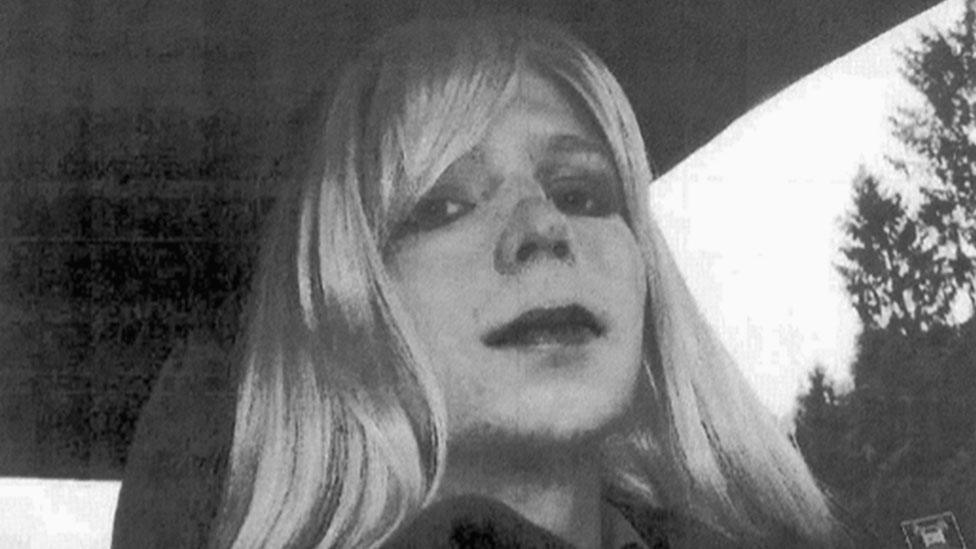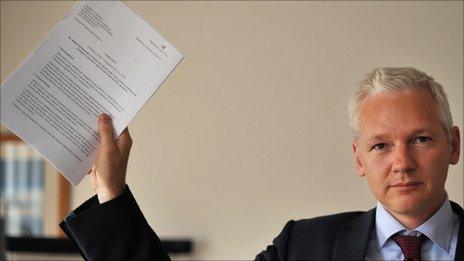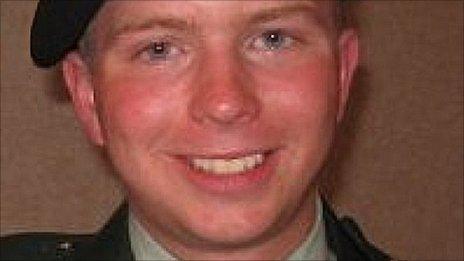Bradley Manning Wikileaks hearing hears final arguments
- Published

Bradley Manning's defence team called only two witnesses, after days of prosecution testimony
The pre-trial hearing of alleged Wikileaks source Bradley Manning has concluded after lawyers made their closing statements.
An investigating officer at Fort Meade military base in Maryland must now advise if he should face court-martial.
A decision is due in January, but could be delayed if more time is requested.
Private Manning, 24, is accused of leaking huge amounts of classified information to Wikileaks while working in Iraq as a US Army analyst.
On Thursday, day seven of the Article 32 hearing, Pte Manning's lawyers made their closing statements after calling just two witnesses.
Prosecution lawyers called a total of 21 witnesses.
The defence's closing arguments were impassioned, alleging that the government failed the emotionally troubled soldier, the BBC's Marcus George reports from the court.
They called for reduced charges against the accused, who currently faces 22 separate counts of distributing state secrets and aiding the enemy.
Defence lawyers urged the investigating officer to drop all but three charges, which carry a potential sentence of up to 30 years in prison.
Prosecutors reviewed what they called "irrefutable evidence" in great detail, using overhead projector slides and images of Pte Manning's workstations as they made their closing arguments.
Pte Manning remained impassive in the courtroom, consulting with this lawyer throughout the session.
The former intelligence analyst was arrested in May 2010 accused of leaking hundreds of thousands of military and diplomatic cables.
But during closing arguments, Pte Manning's civilian lawyer, David Coombs, challenged the original decision to classify as "secret" the material WikiLeaks published, and reiterated his opening statement that publishing the documents had caused no harm.
"If anything, it's helped," he said.
If tried and found guilty, Pte Manning could be sent to prison for life.
Manning became 'irate'
On Wednesday, defence lawyers called a sergeant and a captain who served with Pte Manning in Iraq.
Sgt Daniel Padgett testified about a counselling session with the defendant in Iraq, during which he said Pte Manning had become "irate" and turned over a table.
He also contradicted testimony by another witness to the incident who said that Pte Manning had to be restrained after reaching for an M4 carbine in the room.

Former hacker Adrian Lamo reported Pte Manning to the US authorities
"I didn't see him go towards the weapons rack," said Sgt Padgett.
The second defence witness, Capt Barclay Keay, said he felt Pte Manning had "wanted to be a good soldier".
The defence says Pte Manning was a troubled young man with gender identity issues, but his superiors failed to provide counselling, take disciplinary action or revoke his security clearance.
Presiding officer Lt Col Paul Almanza asked Pte Manning if he would like to make a statement.
"No sir, I'm good," the defendant replied.
Earlier prosecution witnesses included Adrian Lamo, a convicted computer hacker who reported Pte Manning to the US authorities.
He detailed his online acquaintance with Pte Manning, and said the analyst had referred to a "crazy white-haired Aussie" - seen as a reference to Wikileaks founder Julian Assange.
US Army investigators have testified in recent days that contact information for Mr Assange was found on Pte Manning's computers, along with other incriminating digital footprints.
Following Thursday's closing arguments, the court is expected to take several weeks before recommending whether Pte Manning should face a court martial.
- Published16 December 2011
- Published16 May 2017

- Published16 July 2011

- Published7 September 2011
